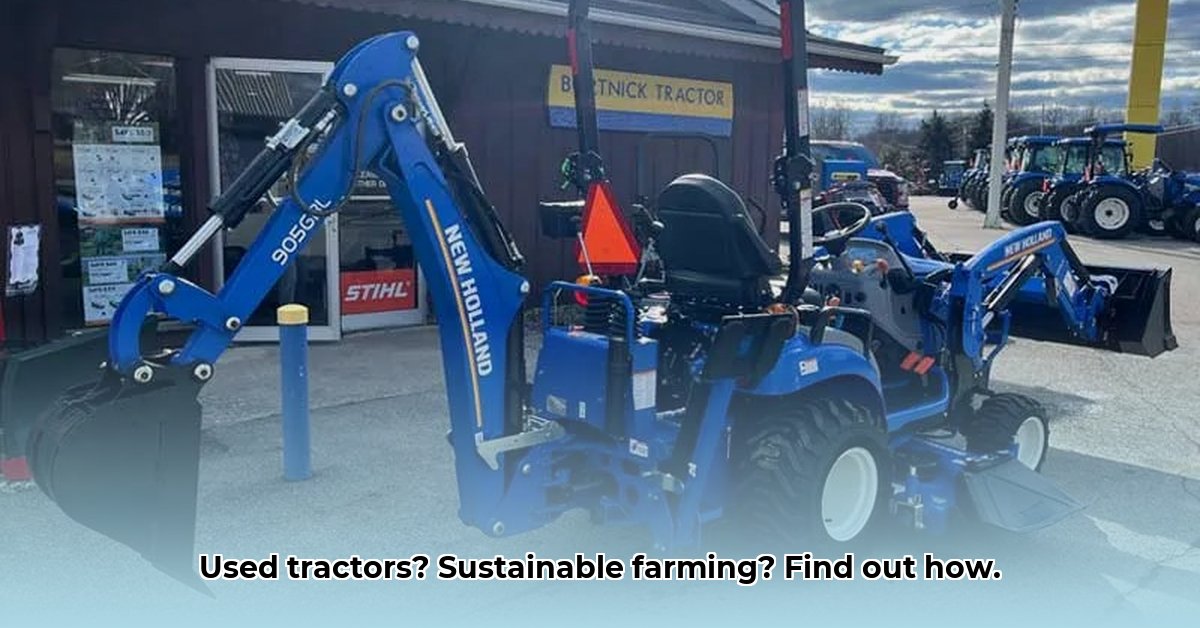
Finding the right tractor can be a challenge, but buying used from a reputable dealer like Bortnick Tractor Cortland offers significant advantages—both financially and environmentally. Need help identifying your tractor's year? Check out this helpful resource: John Deere Serial Number Lookup. This guide empowers you to make informed decisions, ensuring your farm thrives while minimizing its environmental footprint.
Understanding the Used Agricultural Equipment Market
The used agricultural equipment market presents a dynamic landscape of opportunities and challenges. You'll encounter a vast selection of tractors, ranging from older, potentially less fuel-efficient models to newer, more sustainable options. Price often reflects age and condition, but remember that a seemingly cheaper older tractor might lead to higher long-term fuel costs and more frequent repairs. This translates to a larger overall environmental impact and higher operational expenses. Dealers like Bortnick Tractor Cortland provide valuable expertise, bridging the gap between buyers and sellers and offering guidance through the complexities of this market. Always request a detailed pre-purchase inspection report; think of it as a crucial health check for your potential investment.
Did you know that fuel efficiency differences between tractors can drastically impact a farm's annual fuel expenditures? A seemingly small difference in fuel consumption can translate to substantial savings over the life of the tractor.
Choosing Sustainable Used Equipment: A Step-by-Step Guide
Making responsible choices extends beyond finding a bargain. It’s about informed decisions that support both your farm's prosperity and environmental stewardship. Follow these steps:
Define Your Farming Needs: Before you begin your search, clearly identify the primary tasks your tractor will handle. This ensures you select the appropriate size and features, maximizing efficiency and minimizing unnecessary power usage.
Conduct Thorough Research: Explore listings from dealers like Bortnick Tractor Cortland and supplement this with online reviews from other farmers. This peer-to-peer feedback offers invaluable insights.
Prioritize Fuel Efficiency: This directly impacts both your operating costs and your environmental footprint. Newer models often boast superior fuel efficiency, leading to long-term savings and reduced emissions. Look for features designed to enhance fuel consumption (e.g., advanced engine management systems).
Perform a Meticulous Inspection: Never skip a thorough hands-on inspection. Check for wear and tear, rust, and potential mechanical problems. Consider bringing a qualified mechanic for an independent assessment—a small investment that can prevent substantial future expenses.
Review the Maintenance History: A well-maintained tractor typically enjoys a longer lifespan and requires fewer repairs. Request comprehensive service records from the seller, demonstrating a history of responsible ownership.
Negotiate Carefully: Don’t rush into a purchase. Consider the initial price, potential repair costs, and overall condition to secure the best possible deal.
Explore Financing Options: Investing in farm equipment is often a significant expense. Research various financing options, including loans and leases, to find a payment structure that aligns with your budget.
Maintenance and Repair for Sustainability
Sustainable practices extend beyond the initial purchase. Proper maintenance is crucial for extending your tractor’s lifespan and minimizing its environmental impact.
Regular servicing is far more cost-effective than major repairs. Schedule preventative maintenance to proactively address minor issues before they escalate, preventing costly downtime and unnecessary resource consumption. Remember to dispose of used parts responsibly (recycling or proper disposal) to minimize further environmental impacts. Efficient maintenance also translates directly to better fuel economy, lowering emissions.
"Regular maintenance is an investment, not an expense. It significantly extends the lifespan of your equipment and reduces the environmental impact associated with repairs and premature replacement," states John Smith, Agricultural Engineer, Cornell University.
Long-Term Strategies for Sustainable Equipment Management
Sustainable farming demands a long-term perspective. Consider these strategies:
- Technology Upgrades: Invest in fuel-efficient technologies to further reduce emissions and improve operational efficiency. Explore options such as advanced engine management systems or precision farming technologies.
- Partnerships: Build relationships with local mechanics for timely, efficient maintenance and repairs. This minimizes downtime and reduces the reliance on distant service providers.
- Renewable Energy: Where feasible, explore integrating renewable energy sources, like solar or wind power, into your farm's operations. This reduces your dependence on fossil fuels and further strengthens your environmental commitment.
According to a recent study by the USDA, farms adopting sustainable practices have seen a 15% reduction in their overall operational costs. This demonstrates the economic benefits associated with environmentally conscious decision-making.
Resources and Further Reading
- Your State's Department of Agriculture Website
- USDA Resources on Sustainable Agriculture
- EPA Guidelines on Responsible Disposal of Hazardous Materials
Conclusion
Investing in used agricultural equipment doesn’t have to compromise sustainability. By following these guidelines and partnering with a reputable dealer like Bortnick Tractor Cortland, you can acquire a reliable tractor that reduces your environmental footprint while promoting the long-term success of your farm. Remember, sustainable farming is a continuous journey, and every responsible choice counts.